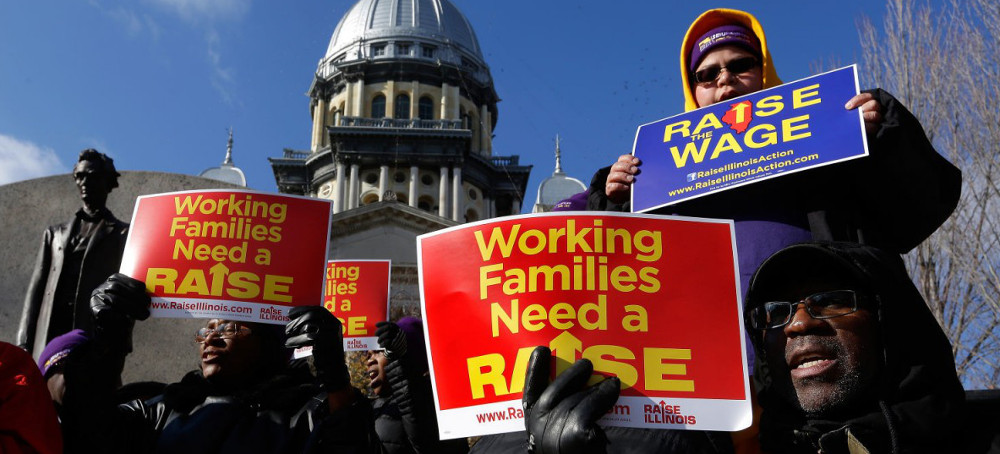What to Do About America's "Labor Shortage?" Easy. Pay People More.
Robert Reich Robert Reich's Substack 'If employers want more workers, they should pay them more.' (photo: Seth Perlman/AP)
'If employers want more workers, they should pay them more.' (photo: Seth Perlman/AP)
Why the solutions offered by the Fed and by corporate economists are dead wrong
So often over the years I’ve found that when a public problem is wrongly described, the solutions posited turn out to be irrelevant or inhumane.
A current example: America’s so-called “labor shortage.”
Jerome Powell, the Federal Reserve chair, says the United States has a “structural labor shortage” that’s unlikely to be resolved anytime soon. The U.S. Chamber of Commerce claims there are over 10 million job openings in the U.S. for which employers can’t find workers.
Here’s the truth: There is no labor shortage.
There is, however, a shortage of jobs paying sufficient wages to attract workers to fill job openings.
(There’s also the demographic reality that the giant baby boom generation is reaching retirement age. But many retirees have returned to work after the pandemic because of inadequate savings or concerns about stock market volatility. If jobs paid more, presumably more boomers would return.)
For most Americans, real (inflation-adjusted) wages continue to drop. Wages have increased about 5 percent over the past year while prices have increased about 7 percent, a net loss for most workers of about 2 percentage points.
Those price increases include the costs of childcare, eldercare, and transportation (cars, used cars, and gas), which are big expenses for many working people.
Meanwhile, the federal minimum wage continues to plummet. It hasn’t been raised in thirteen years – the longest period without a raise in its history. Adjusted for inflation, its real value is the lowest it's been in 66 years.
You don’t have to be a financial wizard to see why some workers might say the hell with it.
Economists offered similar warnings of a “labor shortage” after the financial crisis and recession of 2008-09. But when the economy strengthened and wages rose, the so-called “labor shortage” magically disappeared.
So what should be done about the difficulty employers are having finding workers?Simple. If employers want more workers, they should pay them more.
Jerome Powell and the Fed don’t want to hear this. They’re aiming to deal with the “labor shortage” by slowing the economy so much that employers can find all the workers they need without raising wages.
But this is cruel. Slowing the economy will cause millions of people to lose their jobs — disproportionately low-wage workers, women, and people of color.
Republicans and some corporate economists, meanwhile, are blaming the “labor shortage” on overly-generous jobless benefits. They say the way to get more people into jobs is to make their lives outside jobs less tolerable.
A recent “study” by Casey Mulligan and E.J. Antoni claims that “it pays not to work in Biden’s America,” because unemployment and Affordable Care Act benefits are so generous that “many businesses can’t get workers back on the job almost three years after COVID-19 hit these shores.”
Baloney. Apart from the non-working wealthy and their heirs, most unemployed people are hard up.
Pandemic benefits are over, and America’s social safety nets are in tatters — as they were at the start of the pandemic. Before the pandemic, fewer than 30 percent of unemployed Americans qualified for unemployment benefits, which last no longer than 6 months — the least generous of any other rich nation. Since then, we’ve done nothing to fix this broken system.
Affordable Care Act subsidies, meanwhile, allow low-income people to afford health insurance. Without these subsidies, many wouldn’t get the medical care they need and would face higher odds of getting seriously sick and hence unable to work.
Taken to its logical extreme, the corporate Republican argument might be correct. Eliminate all safety nets and at some point people without jobs will hurt so much they’ll have to take any available job, at any wage, whatever the job demands.
But do this, and we end up with an economy that’s even crueler than today’s.
The reason people aren’t working is that work doesn’t pay them enough, given declining wages and the increasing costs of childcare, eldercare, and transportation.
Both the Fed’s solution (slow the economy so employers can find the workers they need without raising wages) and the Republican corporate solution (slash safety nets so people are so desperate they have to take any job available) are cruel. They would impose huge burdens on many of the most vulnerable people in our society.
If we want more people to take jobs and we wish to live in a decent society, the answer is to pay people more.



